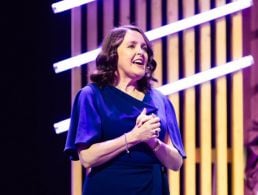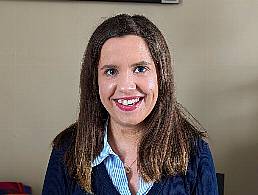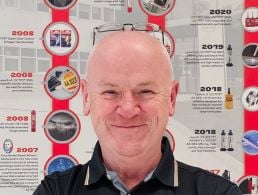Accenture’s Jonathan Bray says that his skills as a magician have enabled him to think outside the box at work and ‘perform the impossible’.
There have been many discussions over the years around the important role that the arts play in the STEM sector, even to the point where many often change this acronym to STEAM – science, technology, engineering, art and maths.
Art and technology often intertwine and the principles of one can influence the other, sometimes in unexpected ways. Just ask Jonathan Bray, a magician who also works as a creative technologist at The Dock, Accenture’s flagship R&D and global innovation centre based in Dublin.
Bray has been at the company for 10 years and also leads its ‘Accent on Enablement’ group in Ireland, which focuses on disability inclusion. He regularly presents on his own personal experience of being diagnosed with autism.
Outside of his work for Accenture, he is a keen photographer and a member of The Magic Circle, a UK-based organisation dedicated to promoting and advancing the art of magic. Bray says he regularly incorporates these skills into tasks on a day-to-day basis – along with a bit of advice from Walt Disney.
What drew you to this career area?
As a child, my dream job was always to work as an animator for Disney or Pixar. However, my understanding was you also had to be quite good at art/drawing, which I wasn’t, so I then turned my attention to the video games industry. However, while I was in university this veered to general software development – as ultimately code is code – and I joined Accenture as a graduate in 2014.
The first five years were spent working on a variety of client projects before I transferred to The Dock, which is one of Accenture’s global innovation centres and is always at the forefront for new technologies, which feels a perfect fit for me. There’s never a dull day.
What do you enjoy most about your job?
I love the work, the culture and the people, so very difficult to pick just one! But overall, I really enjoy the creative aspects of my role and being able to create and build our own unique solutions, whether that turns out to be a game, an XR app or a physical exhibition. It feels like nothing is off the cards.
What’s the most exciting development you’ve witnessed in work?
The most exciting project I got to work on was the partnership with the UK National Theatre. It allowed for theatre-goers who were either deaf or hard of hearing to have the subtitles/captions of a live theatre show display in real time using augmented reality while wearing the glasses. It felt like a project that was years ahead of its time, although it’s a shame it still hasn’t been rolled out to other theatres around the world.
I feel like I also have to give a shoutout to generative AI, and how much of an impact it has made in just a short space of time. It took the internet decades to get to a stage where people were really happy with it, yet it feels like generative AI tools such as ChatGPT and Midjourney are already extremely powerful and well-tuned and are already at the level where they are changing all aspects of the world.
What’s been the hardest thing you’ve had to face in your career?
I was working on a project where the technology was not working at a critical moment. This took a few weeks to diagnose and resulted in many late nights as we approached our launch deadline. We came down to the wire the night before, testing the tech and making small changes. Thankfully on the day, everything seemed to work perfectly, which was a huge relief!
If you had the power to change anything within the STEM sector, what would that be?
I think the big one would be to see more diversity in the sector. From a personal side of being diagnosed with autism, I always find it sad to hear that 85pc of people who have the condition are unemployed.
I don’t know what the exact figure of employment for those with disabilities or lifelong conditions is within the STEM sector, but I do feel it’s something that could be improved upon going forward.
I’m sure there are lots of people out there who are extremely talented and capable of performing at a very high level, but might just need that little bit of extra help or support to make that happen.
Which of your personality traits makes you best suited to your job?
I definitely feel like having a background in magic helps in a wide range of areas. Everything from how to think differently and performing the impossible, to softer skills such as presentations and storytelling, and even things such as how to recover when things go wrong.
Being a big fan of Disney also helps, as Walt often used to say – how can we ‘plus it’ and I feel like I try to apply this on a day-to-day basis.
How do you make connections with others in the STEM community?
I always love chatting with people so I regularly try connecting with others on a daily basis, whether that’s at team meetings, socials or even just in the office canteen or at the coffee dock.
A lot of the time it might just look like small talk, but I genuinely feel there’s so much to be gained from both sides. The people I most aspire to be like always make time for everyone and this is definitely something I try to do myself.
What advice would you give to someone thinking about a career in this area?
Try to get involved with as many different areas or projects as possible, especially at the start. At the time, I often wasn’t thrilled with doing a project that didn’t align closely with my interests or skills but looking back, it was helpful as they made me truly realise what I did and didn’t like, which in turn helped me really appreciate a good project.
It’s always easy to think that the grass is greener on the other side, but there’s a good chance it might not be.
Find out how emerging tech trends are transforming tomorrow with our new podcast, Future Human: The Series. Listen now on Spotify, on Apple or wherever you get your podcasts.




